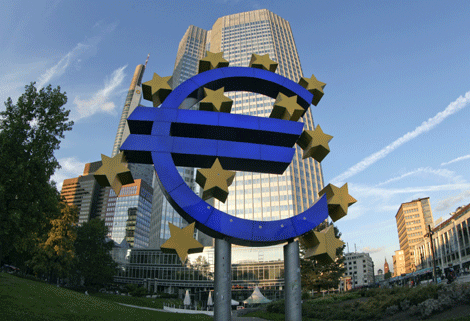Poll: World recession predicted next year
Updated: 2011-09-30 08:25
(China Daily)
|
|||||||||
|
A euro sculpture in front of the European Central Bank headquarters in Frankfurt. According to a poll of 1,031 investors, analysts and traders, 43 percent of respondents expect a world economic recession within the next year. [Hannelore Foerster / Bloomberg] |
Investors question ability of officials, leaders to react to economic woes
WASHINGTON - International investors expect the world economy to relapse into a recession, with more than one in three predicting a global economic meltdown within the next year, according to a Bloomberg poll.
About two-thirds of those surveyed say the international economy is deteriorating, up from just 18 percent who felt that way in the last poll, in May.
The increased gloom is centered on the 17 eurozone countries: Almost nine in 10 said the eurozone economy is worsening, according to the poll of 1,031 investors, analysts and traders.
"Action needs to be taken as soon as possible," said Jawaid Afsar, a trader at Securequity Ltd and a poll participant. "Markets will not wait that much longer." If Europe fails to resolve its debt problem, "this will lead to a recession, which will drag in the US".
A plurality of those polled - 43 percent - expects a world economic recession within the next year. More than seven in 10 foresee a global slump within the next five years.
Thirty-seven percent forecast that a debt crisis in the eurozone will lead to a global economic meltdown within the next year. A majority think that it will happen sometime in the next five years.
'Crisis of competency'
Investors are already responding by husbanding resources. More than two in five say they're increasing their holdings of cash, the largest proportion that reported doing so since the poll began asking that question in June 2010. Fifty-six percent believe that US equities have entered a bear market, according to the poll.
They're even more pessimistic about investment opportunities in Europe. Fifty-three percent cite the region as the least attractive market over the next six months.
Squabbling in the eurozone over sovereign debt and in the United States over the federal budget have led to what JPMorgan Chase & Co Chief Economist Bruce Kasman calls a "crisis of competency" as investors question the ability of authorities to act fast enough to avoid repeat recessions.
"This political gridlock on both sides of the Atlantic unfortunately ripples out into the global economy," says Scott Troxel, head of the Scandinavian desk for Tradition Group in Switzerland. The volatility in financial markets "is a very telling tale of the ubiquitous panic and uncertainty".
Equities slump
Equities have slumped as economic growth worldwide has slowed. Retail sales in the US stagnated in August while a gauge of eurozone manufacturing last month fell to its lowest level in two years.
The world economy grew 5.1 percent last year after shrinking 0.7 percent in 2009, according to the International Monetary Fund (IMF). Global growth of 3 percent or below qualifies as a recession by IMF economists.
Dangerous derivatives
The more than $600 trillion in over-the-counter derivatives outstanding increases the dangers of a meltdown, said Michael McDougall, senior vice-president at Newedge USA LLC in New York.
"That is a big time bomb," McDougall said.
A growing numbers of investors expect equities to fall further in the interim.
About two in five forecast a fall in the Standard & Poor's 500 Index over the next half-year.
That's up from about one in four who said that in May and is roughly in line with those now expecting a rise.
The caution has spread to Asian stock markets. Three in 10 see the MSCI Asian Pacific Index falling over the next six months; fewer than one in five said that in May. Just over 40 percent forecast a rise in the index.
'Messy ending'
Asian investors, usually the most optimistic in past polls, have turned more cautious. Almost half see a global economic meltdown in the next year, compared with one-third of European and US investors who believe that.
Fifty-five percent of respondents from Asia are raising the amount of cash in their portfolios.
Mark Burges Watson, chief operating officer for Japaninvest Group in Tokyo, is putting dollars in his own account and is buying gold on price dips "in anticipation of a possible messy ending in the eurozone - sooner or later".
"My problem is that any short-term fix in the eurozone will not address the basic incompatibilities which have been there since the beginning," he said.
Bloomberg News











